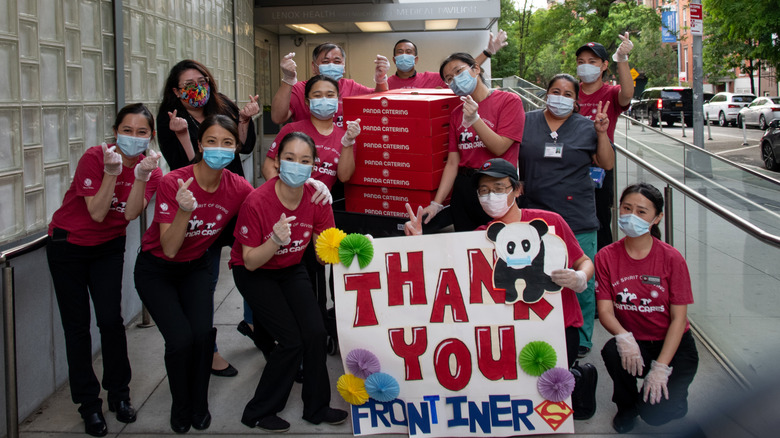The Shocking Way The Pandemic Has Affected Panda Express Employees
The pandemic has changed so much over the last year and a half — so much so that saying things have changed is almost cliche at this point. Still, it'd be impressive to find someone whose life looks exactly the same as it did in 2019. In addition to changing how we live our individual lives, the pandemic has also impacted a lot about the businesses we know and love. From companies working completely from home to reduced capacities in our favorite retail stores, commerce looks different.
But for some organizations, the changes and trials they've had to face over the past year and a half have been more than just adjusting to Zoom meetings. In fact, according to a report from NBC News, Panda Express employees were faced with inexcusable challenges from their guests — on top of working in-person during some of the scariest months of the pandemic and tirelessly providing comfort and food to customers seeking relief.
Panda Express employees experienced increased racism
As NBC News revealed, one particular Panda Express employee shared their experience in a company-branded car. While driving on the highway, they recalled, a truck driver sped up and honked before raising his middle finger and telling them to "go back" to their country. "It was hurtful, frustrating and shocking all at the same time," the employee stated. Panda Express founders and co-CEOs, Andrew and Peggy Cherng, also spoke out to Fast Company, saying, "But it is not just the financial struggle that brings fear; it is something darker: A heightened form of xenophobia." Things got so bad in terms of racism that the company, who is "unapologetically American Chinese and unapologetically made of people of all colors and backgrounds," launched a xenophobia de-escalation program.
Amid the devastating challenges, Panda Express used their platform for good as they kept their locations open to feed healthcare workers, supply drivers, teachers, first responders, and other essential workers. "We like to think that we've used food to make what may seem foreign more familiar and, ultimately, create an appreciation of cultural difference," they explained to Fast Company. "The most beautiful thing is seeing our associates meet the needs of the people around them."

